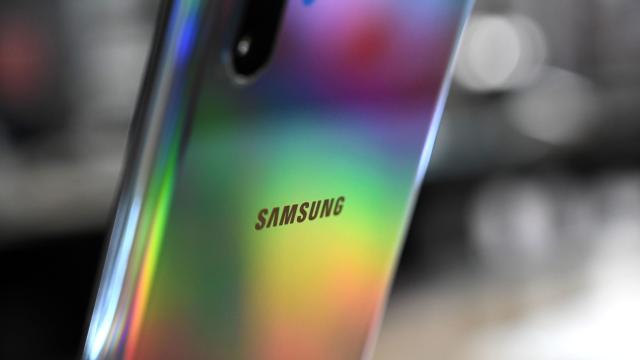Samsung may soon come out with a Bluetooth-based tracker to give Tile a run for its money.
The sharp-eyed folks at 91 Mobiles spotted images of the purported Samsung tracker on Friday posted by the certification authority NCC, where it’s listed as the Samsung Galaxy SmartTag. Similar to Tile’s smart trackers and Apple’s long-rumoured AirTags, it reportedly uses Bluetooth to connect to your other devices so you can find them in those frantic moments when you swear the damn things must have sprouted legs and walked away on their own.
Samsung Galaxy Smart Tag
Via NCC certification pic.twitter.com/yvvvCDIB2R
— the_tech_guy (@_the_tech_guy) January 1, 2021
Samsung’s tracker features a small hole in the corner to easily attach it to a lanyard, cord, or keyring, and it would be powered by a replaceable button cell battery, according to schematics in a regulatory filing uncovered by GSMArena earlier this month.
Rumours have been trickling in for a while that Samsung has been working on a competitor to Tile, but this leak’s our first peek at what the finished product could look like. It also seems to confirm the Galaxy SmartTag moniker, a name referenced in the code of Samsung’s SmartThings app that was spotted earlier this week. Images buried deep within the code look like icons for the tracker, likely for some kind of UI. One of the images bears the description “will help you keep track of objects like wallets, keys, earbuds, and more,” presumably in reference to Samsung’s yet unconfirmed tracker.
The company did not immediately respond to Gizmodo’s request for comment. But with Samsung reportedly gearing up to announce its next flagship smartphone line, the Galaxy S21 series, on January 14, odds are we’ll get an update on the Galaxy SmartTags then and possibly even a launch date. 91 Mobiles speculates that it could cost 1,300 rupees, roughly $US18 ($23), which seems reasonable enough. Especially if it has a replaceable battery, a feature that Tile has only recently begun incorporating into its line. Tossing a whole gadget just for a dead battery never made much sense in the first place, and I’m sure the planet will be thankful for less e-waste chucked onto the rapidly growing pile.
Editor’s Note: Release dates within this article are based in the U.S., but will be updated with local Australian dates as soon as we know more.
